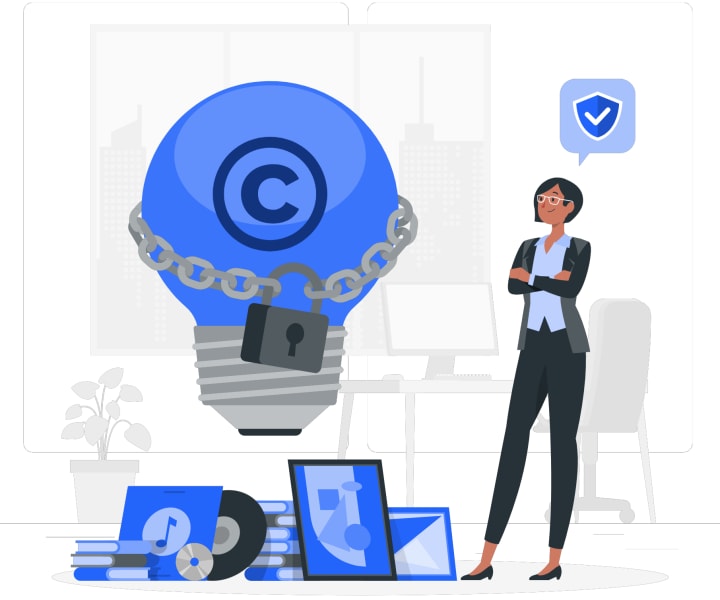A Brief Intro to Copyright and Trademark Law
Protect Your Company's Brand and Reputation

Trademarks and copyrights are essential legal protections that help businesses and individuals safeguard their intellectual property, which is a valuable asset.
Understanding the differences between these two types of protection can help you better protect your intellectual property or avoid infringing on the rights of others.
Trademarks can protect a business's brand and reputation by preventing other businesses from using a similar name or logo. This safeguard can help a business maintain its goodwill and reputation with its customers.
Copyright protection can help a business protect original works, such as artistic or literary works, software, and other creative expressions. This can prevent others from using or distributing the work without permission, which can help a business generate revenue and control the distribution of its products.

Here are some vital legal facts about trademarks and copyrights:
Trademarks:
- A trademark (or just "mark") is a word, symbol, phrase, or design that identifies and distinguishes the source of a product or service.
- Trademarks are used to protect brand names and logos and can also be used to safeguard slogans and other distinctive elements of a brand.
- A mark must be distinctive and not likely to be confused with other marks in the same industry to obtain trademark protection.
- Trademarks can be registered with the United States Patent and Trademark Office (USPTO) or with a state trademark office.
- The registered trademark owner has the exclusive right to use the mark with the goods or services it covers.
- Trademarks can be forfeited if they are not used continuously or become generic.
The top most recognizable brands in the world, including Coca-Cola, McDonald's, Amazon, and Disney, all have ironclad trademarks. And these trademarks protect the unique names, logos, and symbols of their products and business brands.

Copyrights:
- A copyright is a legal protection that covers original creative works, such as literature, music, art, and software.
- Copyrights give the creators of these works the exclusive right to reproduce, distribute, license, and sell their works.
- To be eligible for copyright protection, a work of authorship must be original and fixed in a tangible form, such as written down or recorded.
- Under the Copyright Act, all copyrightable works are automatically protected. It doesn't matter if the work is published or unpublished. But federal registration (indicated by the © symbol) offers much more protection.
- Federal registration grants the copyright holder the right to sue for any infringement, including the right to attorney's fees and statutory damages.
- A copyright doesn't protect ideas, facts, methods of operation, or systems.
- The copyright protection term varies depending on the type of work and when it was created, but it generally lasts for the life of the creator plus a certain number of years after their death.

Two Recommended Intellectual Property Books
Nolo, formerly known as Nolo Press, is a publisher that produces do-it-yourself legal books and software that make the law accessible and understandable. I own several of their books and highly recommend their products.
Their trademark book can be found on their website or on Amazon here.
Nolo's copyright book can also be found on their site or on Amazon here.
Summary
Trademarks and copyrights are essential tools that help to protect the rights of creators and businesses. But they are just two of the many types of intellectual property protection available.
Overall, protecting trademarks and copyrights can help a business maintain control over its intellectual property and prevent others from unfairly benefiting from its creations.
Understanding the legal facts about these forms of intellectual property can help you effectively protect and enforce your rights. If you have questions about protecting your intellectual property, you should consult with an attorney specializing in intellectual property law.
Disclaimer: This article contains affiliate links. If you purchase through one of them, I may earn a small commission at no extra cost to you.
Additional Disclaimer: The original version of this story was published on another platform. Link to original version: https://medium.com/@randymasters/a-brief-intro-to-copyright-and-trademark-law-d74695678b28?sk=5a39c9dc032248c2a91baf429da86398
About the Creator
Randy Masters
Attorney, writer, and content creator. I write about passive income, affiliate marketing, AI tools, legal issues, content creation, books, and side hustles. I live in New York City.
See more at www.bestmoneyhustles.com






Comments
There are no comments for this story
Be the first to respond and start the conversation.